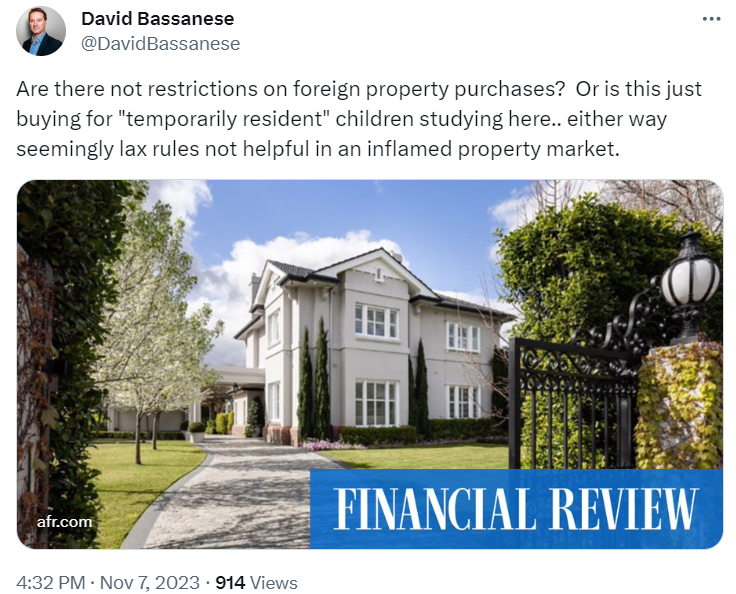A new UTS Survey on the Australia–China relationship shows that Australians are becoming increasingly negative towards Chinese investment in the nation’s real estate:
Only 28% of Australians said that ‘Chinese investment in Australian residential real estate brings a lot of benefits for Australians (e.g., construction, new dwellings, jobs)’, a four-year low. Agreement with this statement has incrementally decreased over the last four years.
A clear majority of Australians (80%) said that ‘Foreign buyers from China drive up Australian housing prices’, a seven-point increase from 2023 (73%), almost back to an 82% high recorded in 2021.
Nearly three-quarters (74%) of Australians also said that ‘Chinese investors have negatively affected the rental market for residential real estate in Australia’, a six-point increase from 2023 (68%) and reflecting a four-year high.
The belief that ‘Australia should restrict the amount of investment in residential real estate that is permitted from Chinese investors’ is also at a four-year high, with 83% of Australians agreeing with the statement.
The increasing angst among Australians follows regular anecdotal reports of Chinese buyers paying extraordinary prices for Australian homes.
For Example, in November 2023, The AFR reported the following:
Wealthy Chinese buyers are taking private jets to Melbourne to purchase mansions in Toorak – the city’s most expensive suburb – on the spot, says Toorak buyer’s agent Alex Bragilevsky”.
“Mr Bragilevsky… says 90% of the work he now does is for Chinese buyers”.
“I’ve facilitated $135 million of real estate deals [in Toorak] in the past six months”, he told The AFR. “All these buyers were Chinese”.
“The Chinese will pay over the odds for single dwellings”, he said.

In March, The AFR reported that a Chinese FIRB-approved temporary migrant outbid locals by $1 million for a Miami-style mansion at Mermaid Waters in the Gold Coast:

The statements from a Gold Coast real estate agent was alarming and indicated that Chinese buyer demand had surged:
“This was a FIRB buyer [a non-permanent resident required to get Foreign Investment Review Board permission to buy a new home]”, the agent told The AFR.
“I have noticed in the last six months the influx of Chinese buyers at auctions and buying has been as high it was pre-COVID. They’re definitely getting access to cash and repatriating it to Australia”.
“They seem to be getting it out more easily than I originally thought. I thought it was lot more complicated. There are multiple cash buyers we’re seeing. I’m only talking about the luxury end of the market”, the agent said.
Recent data from real estate experts Juwai IQI, PropTrack, and the Australian Treasury also showed an increase in interest in Australian property on a global scale, led by China.
Juwai spokesperson David Platter stated that the firm had “been working with a lot of Chinese ever since the borders opened. Presumably as flights continue to increase we will see buying increase”.
“These people are upper-middle-class and wealthy from a Chinese standpoint. They are buying townhouses, houses and large apartments at $1.5 million, $2 million, $2.5 million and up”.
The Australian Treasury also revealed that foreign buyer approvals surged by 40% in the latest quarter of 2023 compared with the previous year, with Chinese buyers leading the way.
How the above anecdotes translate into FIRB numbers remains to be seen.
Regardless, the federal government should ban temporary residents from purchasing established Australian homes.
Implementing a ban on temporary residents would revert the rules back to what existed prior to the Global Financial Crisis (GFC). That is, before the Rudd government carelessly opened up the established housing market to temporary residents in 2009.
Australia must also implement the Tranche 2 global anti-money laundering (AML) rules pertaining to real estate gatekeepers, including real estate agents, lawyers, and accountants.
Australia has delayed the implementation of these global AML rules for around 15 years, which has made Australian housing a magnet for dirty foreign money and helped to inflate housing prices.

